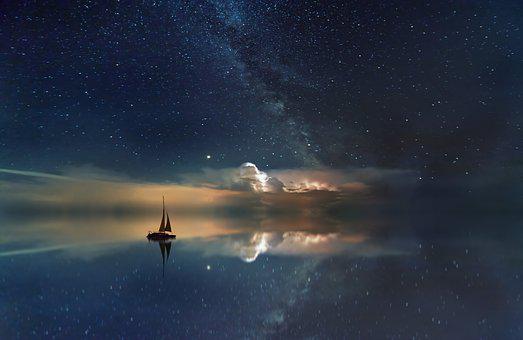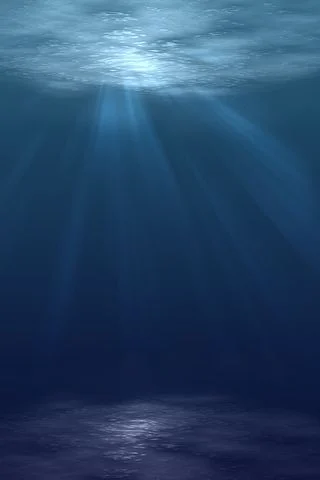At the base level of our being there is a blankness. A void or emptiness into which all prior held convictions, beliefs, and understandings regarding the world and our own self-concept collapse.
At previous points on the path this may be understood as a dark night of the soul, where we plunge into darkness and despair due to reorientation and growth.
Here it is a revelation of emptiness, a quieting of mind and a settling of being. Long gone is the endless grasping, the searching for the next spiritual revelation, for the next book or teacher or thing to fill the soul-sized hole in our being.
Left behind is the need for approval, the endless competitions of the ego, and the desire to be anything other than what we are. There is a tension between endlessly evolving, knowing how truly small we are in the grand scheme of things, and releasing the need to endlessly be on a quest to prove ourselves worthy and lovable.
The end of the spiritual quest is a release of interests, of ways of being, until the mind and soul quiet. There are no longer conflicts within the self, and the desire to be ordinary– rather than special or large to feel worthy– emerges.
This finding is an ability to stand at the bottom of the ocean, knowing that at the bottom of the ocean that there are still waves, still the movement of a whole ocean going through the cycles of death and birth and the immense suffering that we all experience as humans. But there is stillness. The stillness that can only come from finding and embracing the simplicity of our being.
Grace is found in the simplest aspects of life. Those moments in which we truly are in the present moment. These moments are perfection and show us the underlying light and beauty of the world, and in one another.
These moments are like a light that emerges through our being, and the beauty and stillness that emerge from them is quite profound, even if experienced momentarily.
When individuals first come across this blankness there is often a confusion. It is too often felt as the prior despair and depression of the suffering we all experience as humans. We do experience great suffering, and change– especially large shifts in identity– results in a type of collapse and reorientation that is hard on the mind and soul to reorganize around.
This is especially true in spiritual awakening, where the experience of reorientation again and again over long periods of time can be wearing. It is also true of spiritual revelation, where a moment of inspiration and grace or kundalini rising can bring such light but after comes forward every aspect of our being that is not in that state.
We are not one being, we are a collection of selves, some much more aware than others. We have aspects of self that may be highly realized, and other aspects that may remain in a child-like state, confused and lonely and waiting to be loved.
Experiencing spiritual revelation is especially difficult as we hold onto so much, and the experience of sudden revelation means that we now know (we feel, we have experienced in a bodily way) what underlies our being, what goes beyond our suffering. But then we are faced with this knowing paired with all of the aspects of our being that are not in that state.
Such experiences easily put someone into spiritual emergency, as when we are faced with the immense suffering that our bodies have buried and we continually live out in our daily reality, it is often too much to bear. In such times reaching out for support is often necessary.
In other times this blankness is reached and it is greatly feared because we are used to the quest. We are used to filling our lives with egoic competition, with proving ourselves worthy. We are so used to our own self-hatred, our desire to destroy ourselves and the world, that we simply do not understand what another way of being would look like.
It is at this point of emptiness that the base aspects of our being– our own self-hatred– emerges. Every aspect that does not feel lovable and worthy expresses itself.
This time is often confused for times in the past, times of depression and despair and dark nights in which we are subsumed in depression and pain.
In my first book, The Spiritual Awakening Guide, I call this base level of our being the destroyer because it is aligned with our death impulse, the deepest aspects of our shadow, the ocean floor of our being.
Stumbling across the blankness without direction (such as a spiritual teacher who has truly experienced this and can offer guidance/support) can mean languishing in this state, typically for a long period of time.
When everything collapses into emptiness, nothing has meaning or purpose any longer. A latent atheism emerges, as the connections of soul that we had experienced in the past and all that we have learned is rendered as pointless. We can see our prior experiences and understandings of reality as faulty. Many individuals feel like frauds or imposters at this point, as great faith can be experienced (felt, directly known) and it can vanish at this stage.
At this stage an understanding of our selfishness and the way we have previously engaged with reality also emerges. Even the spiritual path can be seen as immensely selfish. It is by accepting this selfishness that we can recognize how being of service, in small and larger ways, is so vital to us individually and collectively.
While this emptiness is at the base of our being, it is not the end of the path. It is simply a stage of spiritual awakening. Beyond this void is spiritual paradox: the experience of emptiness and fullness simultaneously.
It is an emptying of our proverbial cups to be completely filled with light. We cannot experience the joy and creativity and light of being without being willing to experience our darkness; to settle into the still aspects of ourselves.
It is by encountering the destroyer that base panic arises. The fear of death, the fear of a nervous system wired to anticipate a world that will ultimately create harm for it.
If this fear is faced, the panic is shown as bliss. This panic truly shows its face as not a fear of death, but a fear of life and truly living.
Yet another paradox, but in higher spiritual states we so often confuse panic and bliss as they emerge from the same source. Called dakini bliss, or by any other name, it is the emergence of the base fear of our system so we can finally face what is preventing us from living our life.
In facing this panic and this emptiness, we find that it transforms. Panic to bliss, emptiness to fullness. Both simultaneously. It is in embracing this emptiness that we can see that it is not empty at all: it is both empty and full.
The spiritual path eventually allows for us to experience the full spectrum of our being and to simply allow. It is in this allowing that we can find ourselves at that bottom of the ocean, comforted by an essential stillness of self, recognizing that the waves of life are simply life. Suffering is to be expected. If we recognize this, we can be free.
Mary Mueller Shutan is a spiritual teacher and author. Her books include The Spiritual Awakening Guide and Working with Kundalini.



Hi Sarah-
The emptiness that I describe is like a field of light and possibility. While there is quite a bit of deconstruction of self necessary to get to this place, such deconstruction of things like meaning and purpose bring about the recognition that we get to decide what our meaning and purpose in this lifetime is. The emptiness is more like a playground, in which we get to construct, to build.
The fullness that I describe is oneness. On a simpler level, it is connection. Connection to self, to other people, to the world/nature, to spirit. This typically comes after experiencing emptiness, in which a decision to give over the individual, suffering self to something larger, happens.
To get to this point a lot of sensitive, feeling people experience things like meaninglessness, despair, depression, isolation, and all sorts of existential quandaries. This is different than the experience of emptiness or fullness, and indicates that letting go further of pain and anchoring more into the body, and the human life, would be helpful.
Best of luck, and I hope that helps–
The emptiness, the everything, it often feels like too much to bear, and a very lonely place.
You are the student, you ask the question, you are the teacher, you provide the answer. Why ask? Why answer? Why write? To satisfy your longing? To create meaning? To be seen? By whom? The question is answered, now you can stop and rest, is this the bliss? Is there something I’m missing? Is this it or is there something more on the other side that I have still not yet reached? What is this bliss that is talked about? What I experience is emptiness/everythingness. I would not describe it as bliss.
well said
I experienced this stage, I was stuck in it for some time with fear, then I realised I must put out my light and become one with the darkness, when I did I felt alone with it, I embraced it and sat in it for some time, I felt no fear it was like my past pain meant nothing anymore, and I felt empty for once. I opened my heart to the darkness, it was then I found the real meaning, I didn’t need the light, I needed to embrace the darkness, to find shadow then light. Although I started with the light then shadow work, but there was this point when I couldn’t go any further, and thats when I discovered complete darkness with love and becoming it with no fear just emptiness. Shadows dont exist without light.
Hi Paul-
I find that nihilism is a stopping point for many of us. I much prefer the sort of existential thought that if nothing matters then that is the ultimate creating ground… we get to create our own meaning and purpose in our existence. From there the stillness and clarity you mention occur. Thanks for your comment
I struggled with nihilism for a bit. Feeling that absolutely nothing matters is an acquired taste. But realized it is actually a bit of a reset, or ground zero. And actually felt liberating, refreshing. And quiet. From there, I can better assess how I want to spend my resources. It’s not a free ticket though. Every choice has pros and conseqenses.
Thank you, Mary.